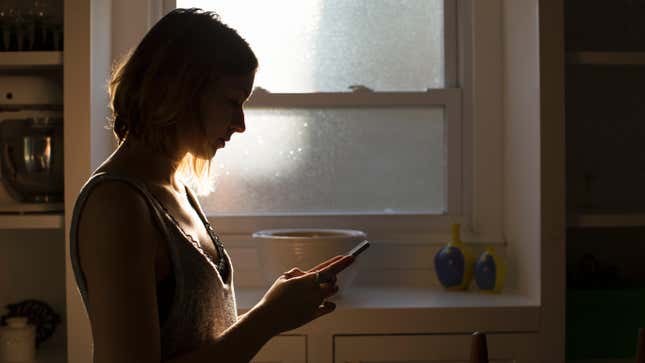Domestic Violence Hotline Reports 99% Increase in Calls Post-Roe
The hotline told Jezebel how abortion bans are now in the "toolbox of abusive partners."
AbortionPolitics

Crystal Justice, chief external affairs officer for the National Domestic Violence Hotline, has heard a lot of gutting cases of domestic violence from hotline callers over the years. But since the Supreme Court overturned Roe v. Wade last June, Justice told Jezebel that a few calls, in particular, have stood out to her—namely one woman who said her partner was intercepting her birth control pills after learning she was having them mailed to her. She eventually became pregnant but lived in a state where abortion is banned, and called the hotline desperate to learn her options.
Justice also heard from callers, post-Roe, whose abusive partners have weaponized their states’ abortion laws, as well as the widespread confusion around the laws’ particularities, to confuse and control them. “We’ve seen abusive partners weaponize the possible criminality of accessing abortion, or wrongfully tell a victim that if they do access abortion, they themselves could go to jail, or they’ll report them to the police,” Justice said. (Pregnancy outcomes and self-managed abortion are heavily policed and can lead to criminal charges—but no abortion bans currently in effect criminalize the abortion patient.)
Overall, the National Domestic Violence Hotline said they’ve seen a 99% increase in calls from people saying their partners are trying to control their reproductive choices (which domestic violence experts call reproductive coercion) since Roe was overturned. The hotline told Vice News that the year before Roe, they received 1,230 calls; in the year since, the hotline’s received 2,442
The jarring data suggests that while abortion bans are “in and of themselves state-based reproductive coercion,” as Justice puts it, they create the optimal conditions for reproductive coercion to be perpetrated by abusive partners, too. A famous study known as the Turnaway Study has found that people who are denied abortion care are at a significantly greater risk of long-term domestic violence. As anti-rape educator and activist Wagatwe Wanjuki told Jezebel last year, abortion bans are “an abuser’s dream.”
-

-

-

-

-

-

-

-

-

-

-

-

-

-

-

-

-

-

-

-

-

-

-

-

-

-

-

-

-

-

-

-

-

-

-

-

-

-

-

-









































